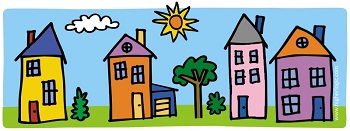We Used To Know Who Lived Next Door

Mamacita says: Next door. Some people don’t even know who their next door neighbors are. We work during the day, and are so busy and tired at night that we no longer invite the neighbors to come over and sit on the porch with us. We live so close to other nice people, and we barely know them.
As a child, I knew who all our neighbors were. Most of them had kids my age or near it, and we played together all the time, inside each other’s houses and in everybody’s yard. Everybody’s mom was all of our moms. We seldom saw any dads, but it was a different era and most of the dads were at work.
We did know that every mom on the block would tattle to every other mom on the block if they saw any of us doing something we shouldn’t be doing. It kept us fairly well-behaved.
When neighborhoods had sidewalks, people used to walk on them. It was another way to meet the neighbors. As kids, we walked almost everywhere on those sidewalks. We walked to school. We walked to the store. We walked downtown. We walked to the library. It was inconceivable to expect a ride to any of these places. I mean, what in the WORLD.
My neighborhood has no sidewalks. People walk their dogs in the middle of the streets here. This is fine, because there is little traffic here, and dog-walking neighbors are usually friendly. I still don’t know their names, but we wave and exchange remarks about the weather.
There is only one house with little kids, and whoo boy, that family would not have lasted two weeks in my old neighborhood. So loud. So intensely, incredibly, unnecessarily loud. Screaming people.
But that’s my neighborhood today. Like most everything else, neighborhoods have changed.
The internet has given us a second chance to hang out with nice neighbors. Tired as we are, we can press a few buttons and have instant access to lots of wonderful people. Our internet neighbors are warm and friendly and we love them, as our parents loved the neighbors next door and across the street and down the block. They had time. We don’t. It’s a shame.
But late at night, after the kids are in bed, when all the actual neighbors are asleep, we can sit at our computers and talk with our internet neighbors, and catch up on their lives, and learn about their children and their jobs and their pets and their homes and their hobbies and interests. We help each other with our problems, and encourage each other. We sympathize, and we rejoice. Just like good neighbors do.
Nothing has really changed except the location of the neighbors. And on the internet, there are no barking dogs, screaming kids, vandals, blaring sirens, loud parties, or cranks. Well, there ARE, but we don’t have to notice them.
Unless we want to.
Yes, our internet neighbors are the finest kind. I love you all. I really do. You are real. I’m real. And if you lived near enough, I would loan you a cup of sugar any time of day or night.
A Woman’s Heart Attack

Mamacita says: I had a heart attack on New Year’s Eve. Actually, it began the Sunday before, but I didn’t know what it was.
I have since learned that a woman’s heart attack is usually very different from a man’s heart attack. We see men having heart attacks in movies and on TV, and it’s always dramatic – stabbing pains, a clutching at the chest, and a heavy collapse. But women’s heart attacks are not like that, at least, not usually.
The thing is, what a woman’s heart attack is like is not easy to pin down. I can only tell you first-hand about my own, but while I was in the hospital, I learned a lot about it that I did not know before. My doctor told me to tell all my female friends, and it wouldn’t hurt my male friends to know this, too, that a woman’s heart attack is a sneaky bitch.
That Sunday night, I felt a nagging, subtle but uncomfortable sensation beneath my left breast. I thought to myself, well, it’s the holidays; I’m crazy busy; I’m stressed; I’m exhausted – all these explanations worked because they were all true. Besides, as I said, it wasn’t really a pain; it was more of a sensation.
However, it didn’t go away.
The next day, it was still there, not any worse, but not any better, and it had spread across my chest. Still not actually a pain – still more of a subtle sensation.
By Tuesday night, it was still there. Still no worse. Still no better. Still not a pain. Still just a sensation.
I thought it might be heartburn, but I don’t really get heartburn. I consulted Dr. Google (never a good idea, by the way) and decided I might have pneumonia. This didn’t overly concern me – they’ve got medicine for that these days.
Later that night – New Year’s Eve – my husband took me to the walk-in clinic inside the nearest hospital. The young woman at the desk asked me what the trouble was, and I told her I had a persistent sensation across my chest.
She raised her eyebrows and said,”We take chest pains very seriously here. I’m sending you to the ER.”
Chest pains. It was the first time that so much as crossed my mind. Chest pains. CHEST PAINS? Wasn’t that a heart attack? Was I having a heart attack? But only old people had heart attacks! I couldn’t be having a heart attack. I just couldn’t be. Where was the drama? Where were the stabbing pains?
At the ER, they took me in hand and looked and listened and poked a few needles in my arms in preparation for things to come and loaded me into an ambulance and took me to the BIG hospital thirty miles away.
There, the waiting doctor (so handsome) cut a little hole in my wrist and threaded a long super-thin wire up my right arm, across my chest, and into my heart. I was getting a stent. Being me, I was awake throughout the entire process.
(It was the pulling back out of that wire that was the weirdest thing.)
Then they wheeled me upstairs to a private room (yay!) and I begin four days of being treated for a massive heart attack.
Massive.
I felt exhausted beyond measure, but otherwise fine. I’m almost always tired; it comes with being a woman.
I was covered with tubes and needles, and was being given medications enough to sink a much bigger ship than me.
The nurses, both male and female, all looked to be about fourteen years old, but everybody does, these days. All were super, super nice.
After those few days, I was sent home and told not to lift anything heavier than a gallon of milk, and not to drive for three days. I was given a bottle of nitroglycerin and told to carry it with me at all times.
Today, almost two weeks later, I feel fine. Still bone-tired, but I honestly don’t even remember not being bone-tired. No pain. Lots of pills to take twice a day. But I am fine now.
The motto of this post is this: Ladies, do not take any kind of chest pain for granted as something minor that will go away on its own. Go to the ER immediately. Your heart attack will typically be unimpressive, undramatic, subtle, sneaky, and reminiscent of a strong salsa aftermath. Men, if your female loved one has these symptoms, take her to the ER. Her heart attack is not like your heart attack.
A woman’s heart attack is unimpressive. It isn’t loud. It isn’t dramatic. You will probably think, as I thought, that it was heartburn. Whatever else you do or don’t do, don’t consult Dr. Google; he’s a lying quack.
I hope none of you ever have to deal with this, but it’s good to know what to expect if it doesn’t happen.
Don’t take your health for granted. Don’t try to be stoic and wait it out. Take care of yourselves, my internet friends who mean so much to me.
Take care of yourselves.
Oh, and I hope you had a more festive New Year’s Eve than I did.
Poetry Friday: January 10, 2020

Mamacita says: I always ask my students for a show of hands: Who hates poetry? Hands go up all over the room, because our students are not taught about poetry; they are subjected to it, and selections from the lowest bidders at that.
I haven’t done my duty by Poetry Friday for a while, but I intend to rectify that, starting today. Or tonight, as the case may be.
Poetry is music, my dears. You hate poetry? You have no favorite songs, then? Take away the melodies and what’s left? That’s right. A poem. Now let me ask again: Who hates poetry? Put your hands down, you bunch of liars.
Robert Frost (the laureate who recited at President Kennedy’s inaugaration) was once asked how he thought the world might end. He thought long and hard about this, and came up with two ways, both absolutely viable.
Fire and Ice, by Robert Frost
Some say the world will end in fire,
Some say in ice.
From what I’ve tasted of desire
I hold with those who favor fire.
But if it had to perish twice,
I think I know enough of hate
To say that for destruction ice
Is also great
And would suffice.
In many cultures, what we refer to as “Hell” isn’t hot; it’s cold. This makes perfect sense to me.
Think about it.
This one hasn’t been set to music, but it’s still considered a lyric.
The ancient Greeks revered poetry so much that three of the nine Muses are in charge of most of the poetry, but the other Muses dip their hand into a lyric or two whenever it suits them. The Greeks were smart; they knew that poetry makes the world go round, and that even the sciences were part of the poetry of the universe. More on the Muses later.






